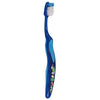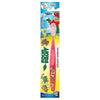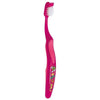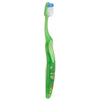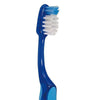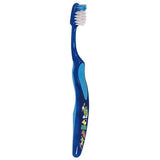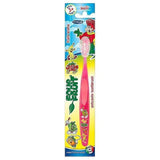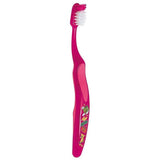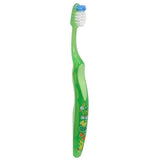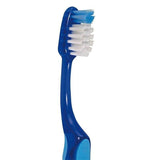Silver Care Soft Children's Toothbrush - Ages 3 and Up

Which toothbrush should you choose for a child aged 3 and over?
From 3 years old, it is recommended to brush children's teeth twice a day.
- They must be brushed with a small toothbrush with very soft bristles.
- It is recommended to brush a child's teeth at least twice a day. You should also clean the gums gently.
- Brushing your teeth before nighttime is particularly important for a child.
If changing your toothbrush regularly is important for an adult, it is also important for a baby.
As soon as the bristles separate on the head, you should quickly change your toothbrush.
A worn brush will scratch the young enamel and traumatize the gums.
- At birth, a baby's mouth does not contain the cariogenic bacteria responsible for premature cavities.
- It is by bringing objects to his mouth that these bacteria enter his body and of course on his toothbrush.
- These are often transmitted to him by contaminated objects or by the saliva of adults.
If the right conditions are met, these bacteria can cause the appearance of a cavity.
Primary caries often occurs before the age of 5.
- It can reach a child's first teeth.
- When the child eats or drinks, food particles stick to his teeth.
- The decay bacteria then transform the sugar in these particles into acids.
- These are the acids that attack tooth enamel
When a child has a cavity, the enamel on the surface of the tooth becomes dull, yellow, or brown.
As soon as decay begins to invade the tooth, it quickly gets worse.
- It will become painful and will interfere with the child's sleep and eating.
- Untreated decay can have a negative impact on growth and language learning.
- You must consult a dentist because it must therefore be treated quickly.
How to reduce the transmission of bacteria in your child's mouth?
- Watch everything your child puts in their mouth.
- Avoid kissing your child on the mouth.
- Do not use the same spoon to taste your child's food.
- Your child must have their own toothbrush, they must not share it with anyone.
- Always dry your toothbrush in the open air, not in a cover, with the head facing upwards.
As for adults, your child's toothbrush should not touch other toothbrushes in its storage glass.
- Very soft children's toothbrush.
- Handle decoration pattern to encourage brushing.
- Use with a fluoridated toothpaste appropriate for your child's age.
- A pea-sized dose of toothpaste is enough for a child aged 3 to 7.


